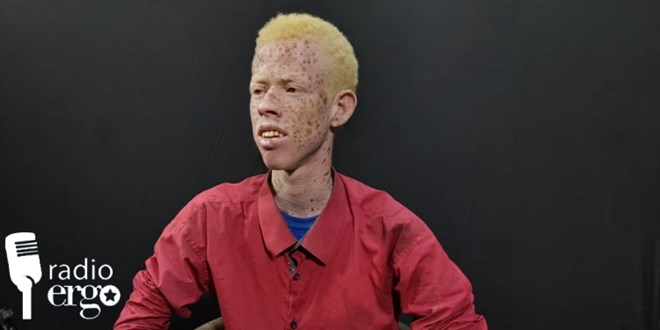
Thursday June 1, 2023

Elmi, 25, struggles to fit as an albino in Mogadishu/Rijaal Abdi/Ergo
Elmi Bile Mohamed, 25, believes that as long as he lives in Somalia, he will never get a job because of the stigma and discrimination against him as an albino.
After failing at every job he ever applied for, he has been reduced to begging in the streets, getting a couple of dollars at most.
“I live on what people give me,” he told Radio Ergo. “I am faced with constant discrimination due to my colour, because I don’t look like other people. If I sit with people they will tell me to go away them as if I have an infectious disease.”
His one shot at work was in a car wash in Beletweyne but that did not last for long. He migrated from Beledweyne in 2018 hoping to find a better life in Mogadishu, leaving behind his parents, and his three siblings who also have albinism.
“I have been looking for a job everywhere I go. People tell me that I can’t work and ask me to go away. They say you are such a sick person and you can’t work, so I just walk away because they refuse to give me an opportunity,” he said dejectedly.
Elmi got married in Mogadishu but as he has no income to support his wife, he sent her to her parent’s house in Beledweyne. Whilst the whole family is expecting something from him in the capital city, he has nothing to send them.
He avoids public places, such as restaurants or business centres as his presence upsets some people.
Education centres have never embraced him either. School principals told him that other students would not want to share a classroom with him and they could not provide a private space for him.
Elmi told Radio Ergo that he loved to study since he was young, but never had the opportunity to sit in a classroom.
“When school children see me, they throw things at me. Children say that I’ve been cursed,” he said.
The same stigma has faced Ibrahim Sheikh Abdullahi, 36, throughout his life. He runs a small table in Hamarweyne selling utensils that he started in 2021 with $600 given by a businessman. It brings in little more than a dollar a day, not enough for his wife and four children. He receives occasional money from his relatives.
Customers and other business people treat him differently from everyone else.
“When people see us, they ask, what happened to you, why are you like this? People don’t understand and hurl insults, but I don’t pay any attention. I try to just carry on with my business,” he said.
Doctors have advised Ibrahim to use suncream and wear clothing to protect himself against direct sunlight but he cannot afford to buy them.
“We need health services, we need education, we can’t afford the skin creams or clothing to protect us from the sun. Sunglasses are also prescribed but we can’t afford them,” he said.
Dr Shafi Mohamed, a general practitioner in Mogadishu, explained that albinism is caused by a partial or total absence of pigment affecting the skin, hair, and eyes.
He said it was unfortunate that people were unaware that is not a contagious condition. Ignorance was leading to the discrimination.
“People need to understand that this is a genetic disorder, not a disease spread by saliva, touching, or eating together. They need awareness,” he said. There are no official figures showing how many people live with albinism in Somalia.